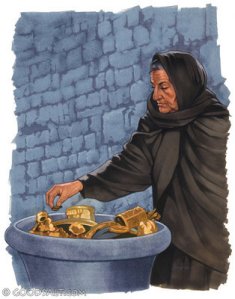THE POOR WIDOW’S OFFERING
(A biblical refection on THE 32nd SUNDAY IN ORDINARY TIME – 11 NOVEMBER, 2012)
Gospel Reading: Mark 12:38-44
First Reading: 1Kings 17:10-16; Psalms: Ps 146:7-10; Second Reading: Heb 9:24-28
The Scripture Text
And in His teaching He said, “Beware of the scribes, who like to go about in long robes, and to have salutations in the market places and the best seats in the synagogues and the places of honor at feasts, who devour widows’ houses and for a pretense make long prayers. They will receive the greater condemnation.”
And He sat down opposite the treasury, and watched the multitude putting money into the treasury, and watched the multitude putting money into the treasury. Many rich people put in large sums. And a poor widow came, and put in two copper coins, which make a penny. And He called His disciples to Him, and said to them, “Truly, I say to you, this poor widow has put in more than all those who are contributing to the treasury. For they all contributed out of their abundance; but she out of her poverty has put in everything she had, her whole living.” (Mk 12:38-44 RSV)
The worshipers calmly entered the Temple, depositing their donations into the venerable-looking container near the door. Sitting in a chair nearby, Jesus noted the amounts of money each dropped into the treasury. Then He called His disciples over to share His insights about the wealthy and the poor, the big checks and the small coins.
One person had deeply impressed Him – a poor widow, who had given a mere pittance, compared to most of the others. No doubt, He prefaced His remarks with the reminder that He was not condemning the big gifts by praising the small ones. That would have been foolish, for the Temple needed large donations to continue as a place of worship.
Although the widow gave only two paltry coins, worth but a few cents, Jesus was impressed. He praised her because it was a high percentage gift. The others, He said, “gave from their surplus wealth, but she gave from her want ……” The wealthy gave a tiny fraction of what they possessed, but she gave nearly everything she had. The value of the gift was practically nothing but Jesus saw the value of the giver.
Today, many people feel that money is a forbidden topic in the pulpit, that it is unspiritual and unworthy to be associated with worship. Some even say that’s why they avoid church. However, Jesus apparently saw no conflict between scrutinizing the collection basket and preaching the Kingdom of God.
Granted that “money sermons” are overdone by some preachers, generosity is still a valuable virtue. Furthermore, if religion is to speak to our needs, hopes and worries, we must talk of money – which is at the heart of many of our dilemmas. “How much does it cost?” is a phrase continually on our minds and lips. The cost of “running the church” is a heavy burden for all pastors.
Today’s Gospel reading is not trying to embarrass the rich to donate more to the church and charity but is a call for all of us to be generous. Being poor does not absolve one from this. “Two small copper coins” are very pleasing to God if that’s all we can afford. Regardless of the amount, each should make some offering, and it will be valuable if it flows from a spirit of sincere generosity.
Short Prayer: Lord, we are all poor before You. Why should we be afraid to share of what we have received? Please forgive us because sometimes we fail to trust You, even though we know Your return is always more than our small gift. Amen.



